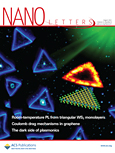 A chemistry paper on nanorods that became a lightning rod for criticism on chemistry blogs this week has been retracted.
A chemistry paper on nanorods that became a lightning rod for criticism on chemistry blogs this week has been retracted.
Here’s the notice for “Chopstick Nanorods: Tuning the Angle between Pairs with High Yield,” originally published in June in Nano Letters by Rajasekhar Anumolu and Leonard F. Pease of the University of Utah:
This article is being retracted due to concerns over the integrity of the data. The originally published PDF of this article is available as Supporting Information.
The problems with the paper became public on Tuesday in a post by UCLA postdoc Mitch André Garcia on Chemistry Blog.
Among other problems, Garcia wrote that three of the paper’s images
show the boundary of one nanorod apparently overlapping the adjacent nanorod.
there was an investigation underway at the University of Utah into this matter and strongly encouraged me not to publish this story until the University completed its investigation.
A dean at Utah — which recently released the report of another unrelated misconduct investigation — confirmed for Garcia that there was an ongoing investigation, and said the university had been alerted to the potential issues by the journal.
The story made its way around the blogosphere, from Chemjobber to ChemBark to In The Pipeline, and took a turn on Reddit. The retraction appeared sometime yesterday.



Woooo… That was quick.
The link to the first author’s CV quoted in the post is no longer active.
Hi Rajasekhar Anumolu CV can be downloaded from the following link https://faculty.utah.edu/bytes/curriculumVitae.hml?id=u0640377
Very fast and commendable. It isn’t often that image manipulation is dealt with appropriately.
The investigation at Utah was supposed to be completed in December. No result has come out yet and Pease is still employed there. What is going on with this situation, and why has Pease not faced any consequences for publishing papers with fabricated data?
I bet nothing will happen.
Eleven years on and Leonard Pease is a “group leader” at PNNL.
How do people with this sort of history get positions?